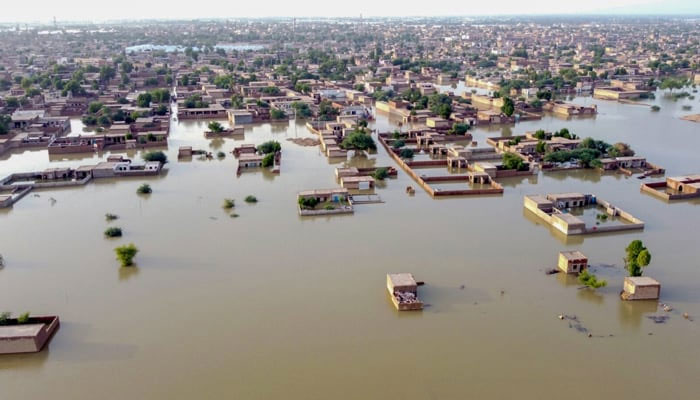Sindh PDMA budget cut by 35.9pc despite heatwaves, flood forecasts
Budget document shows a decline despite the unprecedented heatwaves in the province and the forecasts of massive monsoon rainfall
Karachi: The allocation for the Sindh Rehabilitation Department for the financial year 2024-25, in the country’s most climate change-prone province, has dropped by Rs254.4 million. This represents a 35.9 per cent reduction in the Provincial Disaster Management Authority (PDMA) budget.
The allocation figure, excluding Foreign Project Assistance as reflected in the budget documents, shows a decline despite the unprecedented heatwaves in the province and the forecasts of massive monsoon rainfalls in July.
The rehabilitation department’s allocation has remained sporadic over the past decade or so. In 2011-12, Rs145 million was allocated. The budget was increased to Rs500 million in both 2012-13 and 2013-14.
It was then decreased to Rs360 million in 2014-15, increased to Rs650 million in 2015-16, raised further to Rs692 million in 2016-17, reaching Rs700 million in 2017-18.
The budget dropped again to Rs400 million in 2018-19, further to Rs381 million in 2019-20 before being increased significantly to Rs1.805 billion in 2020-21 and peaking at Rs2.3 billion in 2021-22, then it was slashed again to Rs1 billion in 2022-23 and further to Rs708 million in 2023-24.
Sindh Chief Minister Syed Murad Ali Shah had said in his budget speech in the provincial assembly on Friday that there are no new schemes in the current budget.
The same was reflected in the rehabilitation department’s budget, which has the same four development schemes from 2023-24. The development schemes of the rehabilitation department did not make significant expenditures in the outgoing financial year.
The first development scheme, the Sindh Resilience Project, is funded by the World Bank. As per the budget document, the total cost of the scheme is Rs15.309 billion, of which the WB’s share is Rs14.809 billion and the Sindh government’s is Rs449.16 million.The budget document shows that since the scheme got approved in 2021, the government has spent only Rs72 million from its entire share. The government had spent only Rs9.5 million on this scheme until June 2023.
The actual expenditure for this scheme shown in the budget document of 2023-24 was Rs62.526 million until June 2022, while in the upcoming financial year, this scheme shows an expenditure of Rs72.067 million until June 2023, meaning Rs9.5 million was spent on this scheme from June 2022 to June 2023.
As for another scheme, the Establishment of Regional Offices of PDMA, with an estimated cost of Rs1.835 billion, the government has spent only Rs685.6 million since the scheme was approved in 2017. A mere Rs54.1 million was spent on this scheme from June 2022 to June 2023.
The Mobile Health Care Units Project has an estimated cost of Rs2.393 billion. Since its approval in 2017, Rs1.192 billion has been spent on this scheme. From June 2022 to June 2023, the government spent Rs5.414 million on this scheme, as per the budget document.
The total cost of the fourth and last scheme of the rehabilitation department, Strengthening Tsunami and Earthquake Preparedness in Coastal Area of Sindh Province, is Rs180 million, of which the federal government’s National Disaster Risk Management Fund component is Rs126 million, and the Sindh government’s share is Rs54 million.
Only the Sindh government’s share is reflected in the provincial budget book. The project was approved in 2019, and for the first time, an expenditure of Rs0.27 million was made until June 2023, as per the budget document. This time, a new department named Rehabilitation & Reconstruction of Flood-Damaged Infrastructure has been added to the budget book, with an allocation of Rs12 billion.
The CM said in his budget speech that the provincial government, under the WB-assisted Sindh Flood Emergency Rehabilitation Project, has planned 66 new road sites in 19 districts by November 2024, 80 water supply and drainage schemes in five districts by November 2024. As for livelihood restoration, 700,000 beneficiaries will be facilitated in 14 districts.
-
 Why Ariana Grande Wants A 'tiny Mouse' To Play Her In Biopic?
Why Ariana Grande Wants A 'tiny Mouse' To Play Her In Biopic? -
 Wind Chill Returns With Brutal Cold As Polar Vortex Stalls Over Canada
Wind Chill Returns With Brutal Cold As Polar Vortex Stalls Over Canada -
 Costco $20 Rule Explained As Employee Pay Climbs Across North America
Costco $20 Rule Explained As Employee Pay Climbs Across North America -
 Strange Incident Happened At Nancy Guthrie's Home On Abduction's 10th Day
Strange Incident Happened At Nancy Guthrie's Home On Abduction's 10th Day -
 Tumbler Ridge School Lockdown Underway As RCMP Investigate School Shooting
Tumbler Ridge School Lockdown Underway As RCMP Investigate School Shooting -
 Britney Spears Quietly Parts Ways With Her Music Catalog: Report
Britney Spears Quietly Parts Ways With Her Music Catalog: Report -
 Princess Diana Bodyguard Suspected ‘she Could Die’: Here’s How
Princess Diana Bodyguard Suspected ‘she Could Die’: Here’s How -
 Teddi Mellencamp Marks Huge Milestone With Emotional Message Amid Cancer
Teddi Mellencamp Marks Huge Milestone With Emotional Message Amid Cancer -
 King Charles Makes It ‘absolutely Clear’ He Wants To Solve Royal Crisis
King Charles Makes It ‘absolutely Clear’ He Wants To Solve Royal Crisis -
 Kylie Jenner Looks Back With 'grace' On Early Fame Years: 'Just Being Myself'
Kylie Jenner Looks Back With 'grace' On Early Fame Years: 'Just Being Myself' -
 Royal Family Warned To ‘have Answers’ Amid Weak Standing
Royal Family Warned To ‘have Answers’ Amid Weak Standing -
 Marc Anthony On Why Bad Bunny’s Super Bowl Show Mattered
Marc Anthony On Why Bad Bunny’s Super Bowl Show Mattered -
 Kid Rock Gets Honest About Bad Bunny’s Performance At Super Bowl
Kid Rock Gets Honest About Bad Bunny’s Performance At Super Bowl -
 Kylie Jenner Reveals Real Story Behind Her 'The Moment' Casting
Kylie Jenner Reveals Real Story Behind Her 'The Moment' Casting -
 Jaafar Jackson Breaks Silence On Becoming Michael Jackson
Jaafar Jackson Breaks Silence On Becoming Michael Jackson -
 Eva Mendes Admits She Was Jealous Of Ryan Gosling’s CGI ‘girlfriend’ Rocky
Eva Mendes Admits She Was Jealous Of Ryan Gosling’s CGI ‘girlfriend’ Rocky




